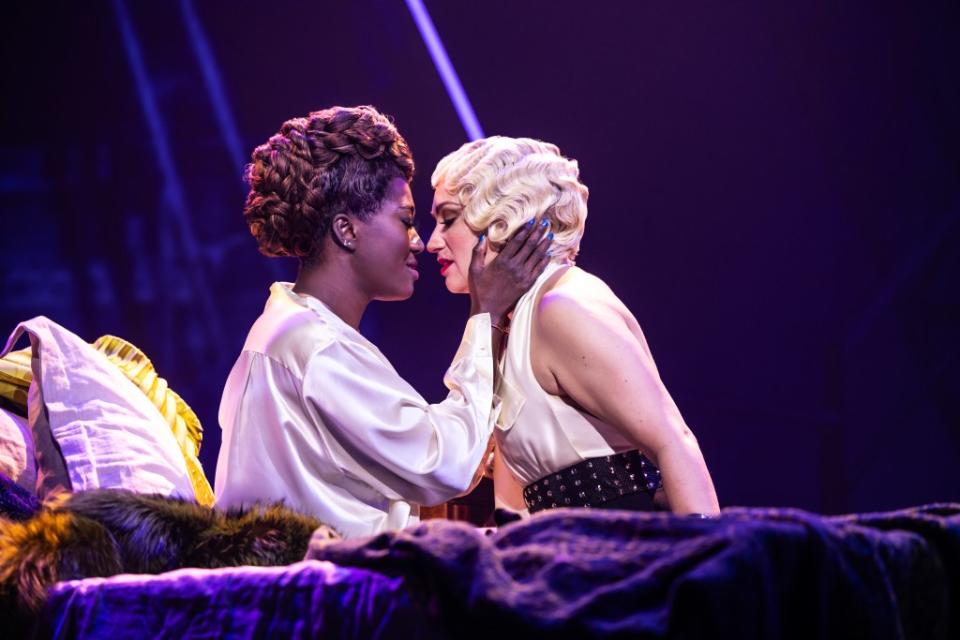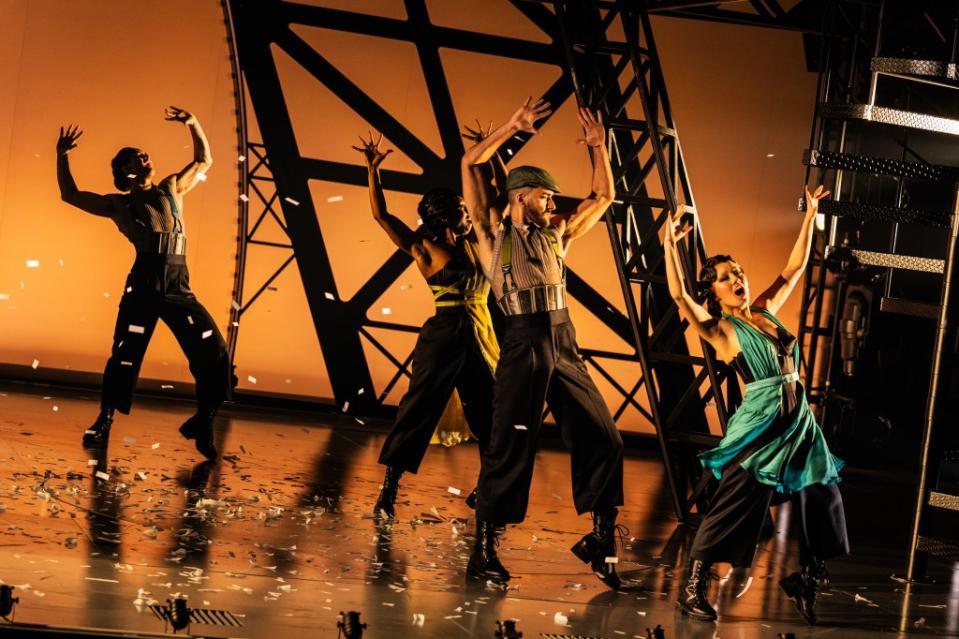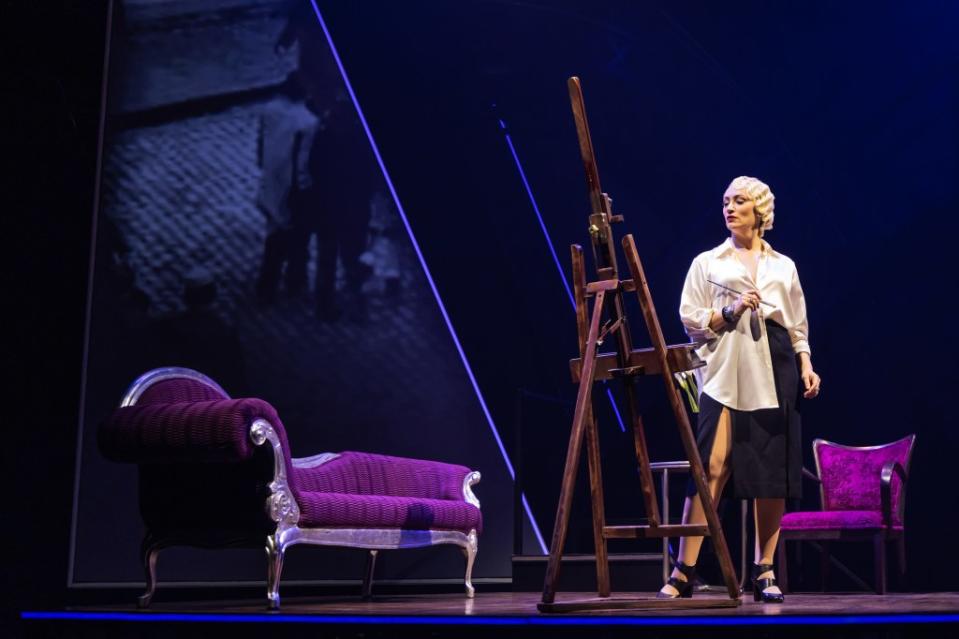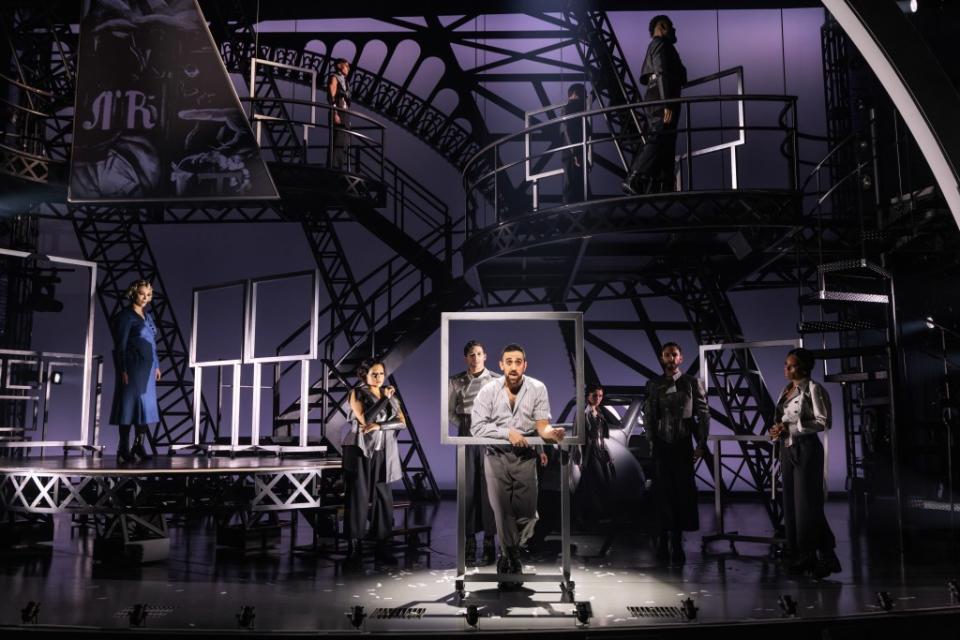‘Lempicka’ Broadway review: Painter musical is an epic wreck

What “Lempicka,” the mystifying new musical about Polish painter Tamara de Lempicka, needs more than anything else is turpentine.
Theater review
LEMPICKA
Two hours and 30 minutes, with one intermission. At the Longacre Theatre, 228 W. 48th Street.
Gallons and gallons of it.
Unfortunately, having garishly blared open Sunday night at the Longacre Theatre, it’s far too late for the creators to start over again on a blank canvas.
And so, the ugly splatter that audiences are left to parse is a ridiculous two-and-half-hour Eurovision act with stratospheric delusions of grandeur.
The unwieldy show, with a book and lyrics by Carson Kreitzer and music by Matt Gould, grapples with such lofty topics as fascism, misogyny, homophobia and the nature of what good art is.
“Isn’t perfection the enemy?,” a character named the Baroness (Beth Leavel), who I could tell you exactly nothing about, asks the founder of Futurism Filippo Marinetti (George Abud), a loon who prizes sleek efficiency over romantic beauty.
Could very well be, Baroness. But in musical theater, coherency is definitely your friend. And “Lempicka” is incoherent.

Start with the comically broad setting. The musical spans the 1917 Bolshevik Revolution, World War I and World War II, finally calling it quits in 1975 America. Fifty-eight years. Take that, “Evita”!
A wife and mother, Tamara (Eden Espinosa) ventures from St. Petersburg, Russia, to Paris, France, where she becomes a bisexual artist best known for her unusual nude portraits of lovers, both male and female.
As director Rachel Chavkin’s production is staged on what appears to be the set from a “Starlight Express” in Peoria, none of these time periods or places feel any different from another. I did, however, begin to daydream about roller-skate races.
Confusingly, characters tend to stay frozen in time, never perceivably changing much from one scene — or decade — to the next. Tamara’s daughter Kizette (Zoe Glick) remains inexplicably a child for some 30 years. Perhaps the rationale there is that the girl has been immortalized by her mother’s paintings, but it’s just more high-minded twaddle.

Once in the City of Lights — more accurately, the City of Lasers — the writers try to give wooden Tamara some much needed personality, and the arctic plot some heat, by shoving in a love triangle between the artist, her husband Tadeusz (Andrew Samonsky) and one of her subjects, Rafaela (Amber Iman).
If that set-up rings false, it’s because Rafaela is a composite of several different partners of Tamara. We never fully buy into her as a real person, because details are so scant. The scandalous Husband vs. Girlfriend face-off is cheap. And in the end, we’re told fictional Rafaela either died in the Holocaust, or lived a long and happy life. Gee, thanks.
Espinosa and Iman have no chemistry, by the way. Forget the common criticism of two actors not being in the same show — this pair isn’t even in the same room.

Gould’s score is a grab-bag of styles and genres. Rafaela’s party-in-the-street entrance number, “Don’t Bet Your Heart,” has a ‘90s Disney vibe, a la “The Hunchback of Notre Dame,” while Marinetti’s beep-boop “Perfection” is an amped-up “Mr. Roboto” by Styx.
The latter — energetically sung by Abud while choreographer Raja Feather Kelly has the ensemble do airplane arms — is catchy, but so is “Kokomo.”
Espinosa is handed some colorless, belty ballads, like “Woman Is,” that she struggles vocally with. Given that Tamara’s story occurs over six tumultuous decades, the actress and character leave remarkably little impression. Lemicka is neither a force of nature, nor a relatable dreamer — she’s a talking paintbrush.
And Kreitzer’s book, besides being strenuous to follow, is tonally unhinged.
Sure, “Les Miserables,” the peer of which “Lempicka” aspires to be, had both the devastating “I Dreamed A Dream” and the silly “Master of the House.”
But that’s a far cry from projecting video footage of Adolph Hitler onstage and then shortly thereafter having a lesbian bar owner named Suzy (Natalie Joy Johnson) joke, “Nice fur. I just love beaver.”

It’s hard to believe this muck is directed by the talented Chavkin, who in the past has staged adventurous new musicals like “Hadestown” and “Natasha, Pierre and the Great Comet of 1812” with undeniable skill and panache.
Here, though, her efforts are wasted on jazzing up a show that’s more concerned with its own warped idea of what epicness is rather than its characters or story.
Tamara begins and ends the messy musical pretty much as Forest Gump — sitting on a bench in 1975 Los Angeles, ready to tell stories about a life lived in the shadow of a changing world.
And, as the curtain went down on perplexing “Lempicka,” a version of Gump’s famous quote went through my head: Broadway is like a box of chocolates. You never know what you’re going to get.
